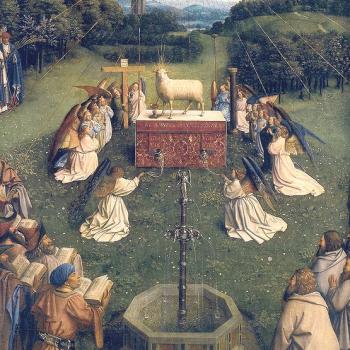Chapter 14 (pp. 123-127) of my book, Reflections on Radical Catholic Reactionaries (December 2002; revised second edition: 17 August 2013; slightly revised again in November 2023 for the purpose of the free online version). Anyone who reads this book should first read the following three introductory articles, in order to fully understand the definitions and sociological categories I am employing:
Introduction (on the book page)
Definitions: Radical Catholic Reactionaries, Mainstream “Traditionalists,” and Supposed “Neo-Catholics” [revised 8-6-13]
Radical Catholic Reactionaries: What They Are Not [9-28-21]
If you’re still confused and unclear as to my meanings and intent after that, read one or more of these articles:
Rationales for My Self-Coined Term, “Radical Catholic Reactionaries” [8-6-13]
My Coined Term, “Radical Catholic Reactionary”: Clarifications [10-5-17]
Clarifying My Coined Term, “Radical Catholic Reactionary” [4-3-20]
This book is modeled after the method and structure of the French mathematician and Catholic apologist Blaise Pascal’s classic, Pensées (“thoughts”). Catholic apologist and philosopher Peter Kreeft described this masterpiece as “raw pearls” and “more like ‘sayings’ than a book . . . ‘Sayings’ reflect and approximate the higher, the mode of Christ and Socrates and Buddha. That’s why Socrates is the greatest philosopher, according to St. Thomas (S.T. III, 42, 4).”
*****
- We are often informed that the “New” Mass is technically valid, but nevertheless “objectively offensive to God.” This is a quintessential example of the exact sort of ambiguity that radical Catholic reactionaries so decry in (what they falsely perceive to be) Vatican II. The New Mass is valid, they usually admit, but then they immediately proceed to tear it down, just as with recent popes and Vatican II. The Church can’t defect, but it can get “very, very sick,” we are told (and there is indeed a sense in which this is true). Most “very, very sick” creatures, however, die. The Church, to the contrary, cannot die, by its very nature, as it is divinely ordained and supernaturally sustained. It can’t die any more than Our Lord Jesus can die (post-Calvary), since it is His Body: an extension of the incarnation.
- Such fine-tuned distinctions made by reactionaries are worthless — distinctions without a difference; equivocation, rationalization, special pleading. It is the spirit of the thing. Who cares about the technicalities, when the outcome is always the same: one or more manifestations of skepticism, suspicion, conspiratorialism, bleak despair, a martyr complex, exaggerated self-importance, and doubt about the Church and its proclamations? This modus operandi, mindset, and mentality is positively Pharisaical in many respects, and reduces logically (taken to its consistent logical conclusion) to the sedevacantist position.
- It’s almost as if these distinctions without a difference are regarded as a sort of challenging game whereby the participant sees how close he can get to the “edge” (heterodoxy; defectibility) without going over it: death by a thousand qualifications and beatings. Who can trash the New Mass with the most flowery, inventive rhetoric, while not ever being brash enough to presumptuously question its validity? . . . Doublethink reigns!
- Reactionaries will argue that one cannot have an informed opinion on the validity of the New Mass unless he is well versed in liturgical history and canon law. Catholic laymen (no matter how actually or allegedly “uninformed”) are perfectly justified in believing — as a function of indefectibility, in faith — that God wouldn’t allow the Mass of the vast majority of Catholics today to be invalid or even “objectively offensive to God,” etc. No one fully understands the Trinity or transubstantiation, either, but we believe in them, because they are doctrines of the Church, Bible, and tradition. The Church is the “expert” — and the Church tells us that the Sacrifice of the Mass today is legitimate, not blasphemous or idolatrous or a mockery, as the anti-Catholics among our Protestant brethren would have it – now strangely copied in some respects by reactionaries.
- One reactionary stated that the Pauline Mass was “fraudulent” and that it “weakens the faith of the faithful.” How does one prove such an amazing, subjective assertion: simply because the crisis coincides in time with the New Mass? The fallacy of that “reasoning” is obvious. The height of the modernist crisis might be said to have been 1968, the very year that Humanae Vitae was promulgated. I am assuming that most reactionaries accept that wonderful encyclical (but perhaps not, as they frown upon Pope St. Paul VI). But by their own warped logic, the teaching against contraception must have caused the large scale disobedience of Catholics in this matter, since it coincided with it.
- It is said that the New Mass caused the widespread lack of belief in the substantial presence of Christ in the Eucharist (some polls show that 70% of proclaimed Catholics deny it, though these can be disputed in various ways). But this is completely unsubstantiated argumentation, and circular reasoning. One could just as well argue (with far more justification) that the incessant Protestant and secularizing influence and incipient anti-traditionalism of our culture led to this demise in eucharistic faith. How do reactionaries “know” that the New Mass is the (sole?) cause? The fact is that they don’t know that, and have no way of proving it. But since it is a convenient fallacy to incorporate within the overall worldview, they uncritically adopt it. It is far worse to have a relatively educated Catholic like most reactionaries blatantly disobeying and disbelieving the Church, its councils and popes, than an ignorant, poorly catechized Catholic who doesn’t understand or accept the Real Presence. “To whom much is given, much is required.”
- One reactionary described the Pauline Mass as a “travesty” and often a “cruel mockery of the unbloody sacrifice of Calvary.” The hostile attitude of the reactionary towards council, pope, and New Mass alike, transcends the technical, legalistic, canonical issue of validity. This is precisely why the crucial underlying schismatic spirit must be focused upon. As this person wrote — “valid or not, . . .” (in other words, that matter is practically irrelevant), it is a “travesty” and a “cruel mockery.”
- Reactionaries always appeal to their belief in validity when their obedience is questioned by orthodox Catholics. Thus, it is “beside the point” in one context (in their internal soliloquies and jeremiads), yet quite to the point and essential as an indicator of Catholic legitimacy in another context (putting forth an “orthodox appearance” to the outside world and the traditional spirit of obedience and submission to Holy Mother Church).
- We object to the routine, casual disobeying of popes, scorn for an ecumenical council, and a pervasive sectarian and divisive spirit among reactionaries.
- Many reactionaries seem to equate communion in the hand, ugly church buildings, the Pauline Mass, terrible catechetical instruction, etc. (all the usual reactionary gripes) with such historical events as the barbarian invasions, the more or less complete eclipse of learning and literacy, widespread sexual debauchery, Attila the Hun and the Moslem conquests, Arianism, Donatism, Monophysitism, and so forth.
- Oftentimes, abuses contrary to the rubrics are what are called into question (almost “throwing the baby out with the bath water”). Reactionaries will often ask: “Is this Mass [the way it is often conducted today] the Mass of the ages?” Well, no, it isn’t, in many ways. If a Pauline Mass is filled with abuses and nonsense introduced into it which haven’t been sanctioned by the Church, it isn’t (in a technical, non-canonical sense) even the New Mass, let alone the Tridentine. An abuse of anything is not identical to the thing itself.
- Reactionaries will contend that the current Mass is a “serious break.” But why would that not imply (applying common sense) that it was invalid? Wouldn’t invalidity be an inherent part of a “serious” break? On the other hand, if it is a legitimate development, then it cannot be a serious break. In other words, one might apply the Newmanian categories of development vs. corruption. But, as is so often the case, it seems that the reactionaries want it both ways. They want to habitually treat it like a corruption, yet retreat behind legalese when it suits their purpose, and speak of “technical validity.” This sort of “Catholic no-man’s land” or “neither fish nor fowl” is what drives observers and critics of reactionaryism crazy.
- If the Pauline Mass is not a “serious deformation,” then it is valid, and in the most important sense, the same Mass. After all, our Lord Jesus is present body, blood, soul, and divinity. How, then, can a Mass where our Lord is substantially present be a “serious deformation” or “serious break” or fundamentally “impious”? If someone simply says that they like the more traditional forms of worship, and the Latin Tridentine Mass, that would be fine with the Church. But so often reactionaries have to run down the Mass that they don’t attend. Live and let live. Worship and let worship. Those at the Mass they irrationally detest receive Jesus, and the ineffable graces of the Holy Eucharist.
- Vatican II stated that Latin ought to be maintained. As for the change in fasting and other penitential practices (another common complaint), in former times there were things like public whippings (even of kings), public confession of serious sins, and so forth. In Ireland they climb up mountains on their knees. The people of that time (or the more devout Irish) could just as well argue that the entire 20th century (if not the whole period after Trent) was extremely lax in such matters. Obviously, these things can be changed and differ somewhat according to culture and time. The Church has every right and prerogative to modify them as she pleases. The Church can also modify the Church calendar.
- I agree partially with reactionary concerns about communion in the hand. I think allowing it (in our particular time and place and in our culture) was arguably imprudent, and played into the hand of the liberals; though I don’t deny that the Church has every right to allow it, and I don’t think it is necessarily harmful to piety. I think that in fact it often is — on an individual level –, however, due to personal and cultural factors.
- The early Church (as seen in the Bible) clearly had women teachers (not priests, of course). Would reactionaries not permit St. Therese of Lisieux or St. Teresa of Avila or St. Teresa of Calcutta to read the Bible at Mass, or to be eucharistic ministers? Reading Scripture or assisting a priest at the altar are not presiding over the Sacrifice of the Mass.
*
*****
*
Summary: Chapter 14 of my book, Reflections on Radical Catholic Reactionaries (December 2002; revised in November 2023 for the purpose of the free online version).













